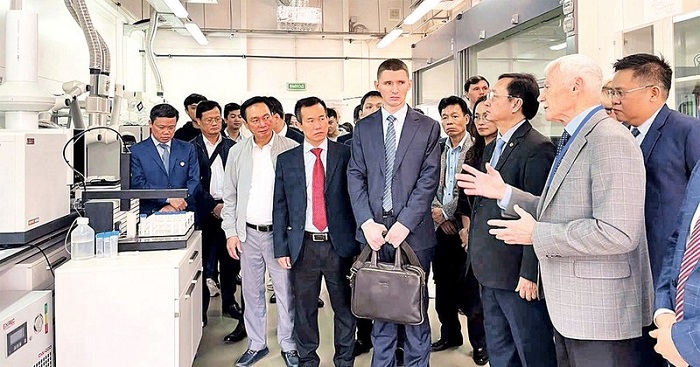
On November 30, 2024, the National Assembly passed a
resolution on Vietnam continuing the implementation of the investment policy
for the Ninh Thuan nuclear power project following an eight-year suspension.
This decision presents significant opportunities for the nuclear sector but also poses considerable challenges. Vietnam must build and develop a team of competent researchers, managers, and operators while enhancing scientific and technological capabilities and advancing industrial production. Ensuring quality and safety in the construction and operation of nuclear power plants is paramount.
Dr. Tran Chi Thanh, Chairman of the Atomic Energy Institute of Vietnam, stated that the nuclear power sector consists of three key pillars: organisations responsible for operating nuclear power plants; agencies that oversee safety regulations and set operational requirements to ensure continuous safety; and organisations conducting research on nuclear technology and safety while developing technologies tailored to each country's specific needs.
Following the model of countries that have successfully developed nuclear power, national institutes for atomic energy play a crucial role. These institutes are responsible for research, advising on technology selection, assessing safety, evaluating the advantages and disadvantages of different technologies, and developing research and development programmes related to reactor technology.
Therefore, in the immediate future, researching nuclear power technology and nuclear safety is a crucial task for the Atomic Energy Institute of Vietnam. This research will provide advisory and technical support to project investors in selecting suitable technologies as Vietnam resumes the Ninh Thuan nuclear power projects. The team of researchers specialising in nuclear power technology and safety will work closely with nuclear power plant operators and national nuclear regulatory authorities.
In the next phase, the construction of nuclear power plants will require a highly skilled workforce across multiple fields. Vietnam must develop a national programme for research and safety assurance, tailored to the country's specific conditions. Additionally, enhancing local capabilities and gradually participating in the localisation and production of nuclear power equipment will be essential for long-term sustainability and technological self-reliance.
The development of nuclear power requires Vietnam to focus on building scientific research capacity, with a team of highly skilled researchers in various related fields such as nuclear physics, automation control, fluid mechanics, mechanical engineering, chemical technology, material strength, steel alloys, and nuclear fuel.
Nuclear power programmes are long-term, requiring continuous efforts from multiple generations of leaders, researchers, and managers to ensure success and contribute meaningfully to Vietnam's socio-economic development.
According to Dr. Tran Chi Thanh, despite notable achievements in recent years, Vietnam’s nuclear sector still faces limitations due to a lack of top-tier researchers. Therefore, a national research programme and a well-structured human resource training plan are essential. This includes comprehensive training programmes covering basic, retraining, and advanced education at various levels, both domestically and internationally, from undergraduate students to internationally recognised leading experts.
Research must go hand in hand with training, and education programmes should expand into foundational fields to meet the growing needs of nuclear energy applications in the context of climate change and Vietnam’s nuclear power development programme.
According to Dr. Vo Van Thuan, former Director of the Institute for Nuclear Science and Technology, Vietnam faces a major challenge, namely a shortage of highly qualified experts, despite the great opportunities in nuclear energy. Therefore, human resource development is an urgent task. Special policies should be introduced to motivate and attract high-quality personnel into management, research, technological development, and nuclear power plant operations.
A fast-track training programme would still require 5–7 years to yield concrete results. Therefore, human resource development must be conducted continuously and systematically, aligned with the long-term progress of Vietnam's nuclear power programme. This approach ensures the country has a scientific and engineering workforce on par with advanced nations, capable of gradually localising nuclear power technology.
To meet practical research needs in nuclear energy applications and support the national nuclear power programme, the Atomic Energy Institute of Vietnam (VINATOM) has identified key objectives, including the development of a long-term research programme focused on building scientific capacity; carrying out high-quality research projects to support the nuclear power sector; and prioritising research directions that directly contribute to Vietnam’s nuclear power development.
In addition, the Institute needs to establish several outstanding research groups, focusing on nuclear power technology, nuclear physics, thermal-hydraulics, and the analysis and evaluation of nuclear safety for selected nuclear power technologies. The Institute will coordinate and collaborate with research units and universities in research and development, as well as gradually build and refine a training programme on nuclear technology.
Furthermore, efforts should be made to actively train human resources through domestic and international training channels, on-the-job training, and knowledge transfer from previous generations to the next. Research should be integrated with training, with research groups being sent abroad for work experience, prioritising the training of young staff. Additionally, short-term and medium-term training courses on nuclear science and technology should be implemented domestically.
Professor Le Hong Khiem, coordinator of the cooperation programme between the Vietnamese Government and the Joint Institute for Nuclear Research (JINR, Russia), stated that in the coming time, the Atomic Energy Institute of Vietnam, as well as scientists in the nuclear field, should have a research programme approved by the Joint Institute for Nuclear Research, Dubna. This would allow Vietnamese scientists to effectively utilise the advanced equipment at the institute, thereby training staff, especially high-level nuclear physicists, while also creating dedicated research groups in Vietnam to best support the upcoming nuclear power development programme.

 Previous page
Previous page Back to top
Back to top







